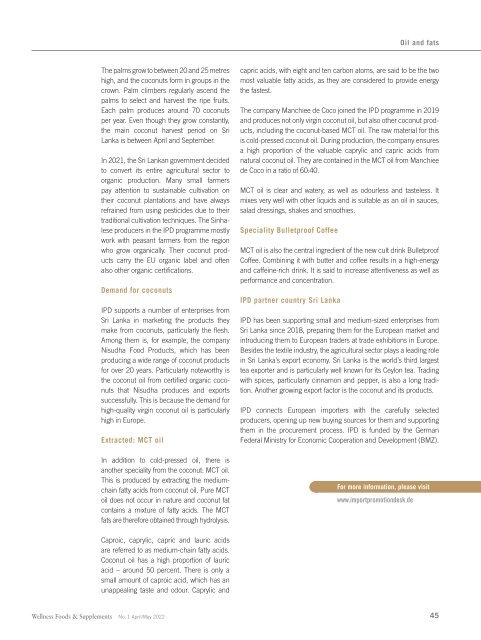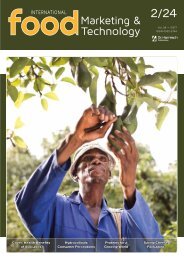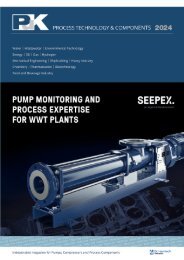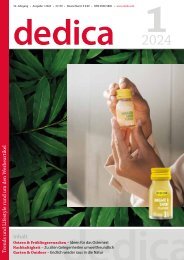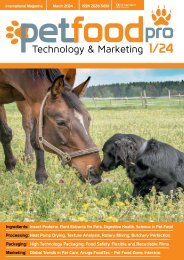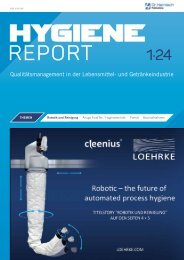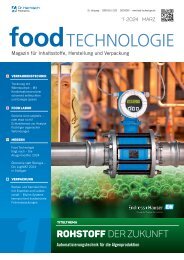Wellness Foods + Supplements 1/2022
Wellness Foods & Supplements is the first European magazine devoted exclusively to health ingredients, nutraceutical foods and beverages. Questions about the trade magazine Wellness Foods & Supplements? Interested in subscribing or advertising? The board of editors at Wellness Foods & Supplements kindly remains at your disposal.
Wellness Foods & Supplements is the first European magazine devoted exclusively to health ingredients, nutraceutical foods and beverages.
Questions about the trade magazine Wellness Foods & Supplements? Interested in subscribing or advertising? The board of editors at Wellness Foods & Supplements kindly remains at your disposal.
Create successful ePaper yourself
Turn your PDF publications into a flip-book with our unique Google optimized e-Paper software.
Oil and fats<br />
The palms grow to between 20 and 25 metres<br />
high, and the coconuts form in groups in the<br />
crown. Palm climbers regularly ascend the<br />
palms to select and harvest the ripe fruits.<br />
Each palm produces around 70 coconuts<br />
per year. Even though they grow constantly,<br />
the main coconut harvest period on Sri<br />
Lanka is between April and September.<br />
In 2021, the Sri Lankan government decided<br />
to convert its entire agricultural sector to<br />
organic production. Many small farmers<br />
pay attention to sustainable cultivation on<br />
their coconut plantations and have always<br />
refrained from using pesticides due to their<br />
traditional cultivation techniques. The Sinhalese<br />
producers in the IPD programme mostly<br />
work with peasant farmers from the region<br />
who grow organically. Their coconut products<br />
carry the EU organic label and often<br />
also other organic certifications.<br />
Demand for coconuts<br />
IPD supports a number of enterprises from<br />
Sri Lanka in marketing the products they<br />
make from coconuts, particularly the flesh.<br />
Among them is, for example, the company<br />
Nisudha Food Products, which has been<br />
producing a wide range of coconut products<br />
for over 20 years. Particularly noteworthy is<br />
the coconut oil from certified organic coconuts<br />
that Nisudha produces and exports<br />
successfully. This is because the demand for<br />
high-quality virgin coconut oil is particularly<br />
high in Europe.<br />
Extracted: MCT oil<br />
In addition to cold-pressed oil, there is<br />
another speciality from the coconut: MCT oil.<br />
This is produced by extracting the mediumchain<br />
fatty acids from coconut oil. Pure MCT<br />
oil does not occur in nature and coconut fat<br />
contains a mixture of fatty acids. The MCT<br />
fats are therefore obtained through hydrolysis.<br />
capric acids, with eight and ten carbon atoms, are said to be the two<br />
most valuable fatty acids, as they are considered to provide energy<br />
the fastest.<br />
The company Manchiee de Coco joined the IPD programme in 2019<br />
and produces not only virgin coconut oil, but also other coconut products,<br />
including the coconut-based MCT oil. The raw material for this<br />
is cold-pressed coconut oil. During production, the company ensures<br />
a high proportion of the valuable caprylic and capric acids from<br />
natural coconut oil. They are contained in the MCT oil from Manchiee<br />
de Coco in a ratio of 60:40.<br />
MCT oil is clear and watery, as well as odourless and tasteless. It<br />
mixes very well with other liquids and is suitable as an oil in sauces,<br />
salad dressings, shakes and smoothies.<br />
Speciality Bulletproof Coffee<br />
MCT oil is also the central ingredient of the new cult drink Bulletproof<br />
Coffee. Combining it with butter and coffee results in a high-energy<br />
and caffeine-rich drink. It is said to increase attentiveness as well as<br />
performance and concentration.<br />
IPD partner country Sri Lanka<br />
IPD has been supporting small and medium-sized enterprises from<br />
Sri Lanka since 2018, preparing them for the European market and<br />
introducing them to European traders at trade exhibitions in Europe.<br />
Besides the textile industry, the agricultural sector plays a leading role<br />
in Sri Lanka’s export economy. Sri Lanka is the world’s third largest<br />
tea exporter and is particularly well known for its Ceylon tea. Trading<br />
with spices, particularly cinnamon and pepper, is also a long tradition.<br />
Another growing export factor is the coconut and its products.<br />
IPD connects European importers with the carefully selected<br />
producers, opening up new buying sources for them and supporting<br />
them in the procurement process. IPD is funded by the German<br />
Federal Ministry for Economic Cooperation and Development (BMZ).<br />
For more information, please visit<br />
www.importpromotiondesk.de<br />
Caproic, caprylic, capric and lauric acids<br />
are referred to as medium-chain fatty acids.<br />
Coconut oil has a high proportion of lauric<br />
acid – around 50 percent. There is only a<br />
small amount of caproic acid, which has an<br />
unappealing taste and odour. Caprylic and<br />
No. 1 April/May <strong>2022</strong><br />
45


